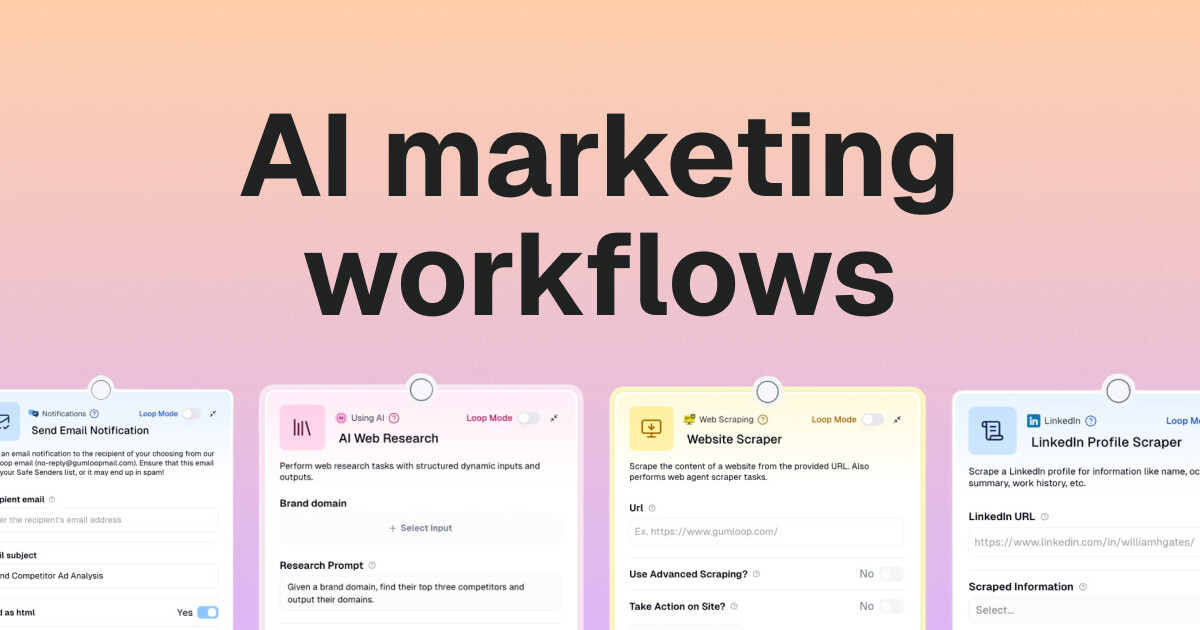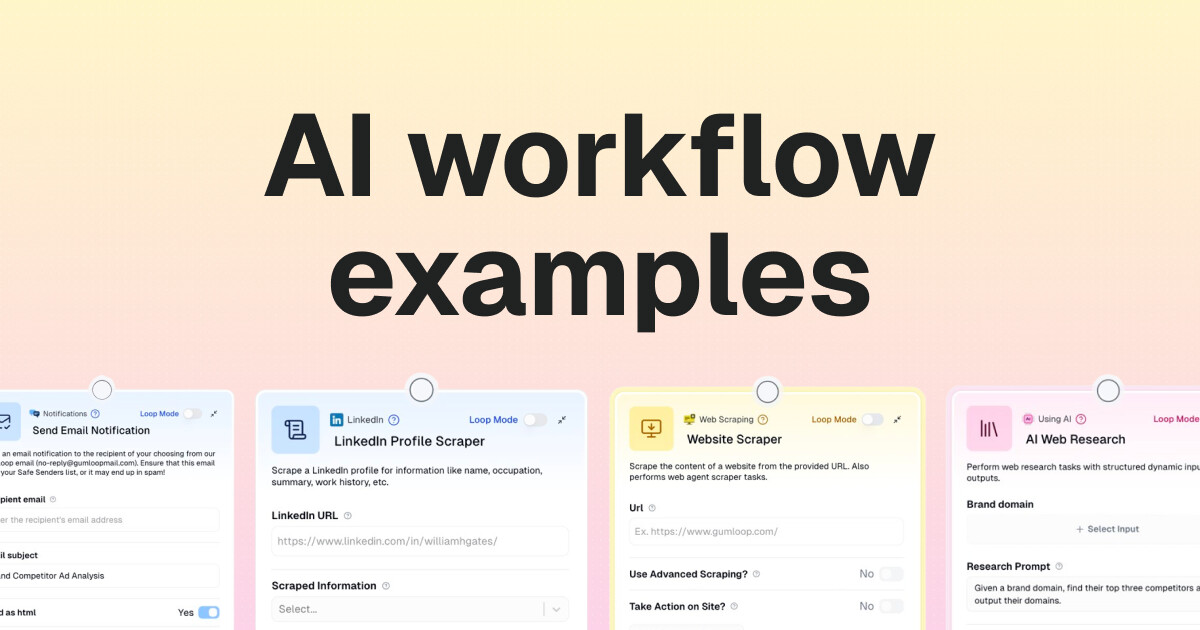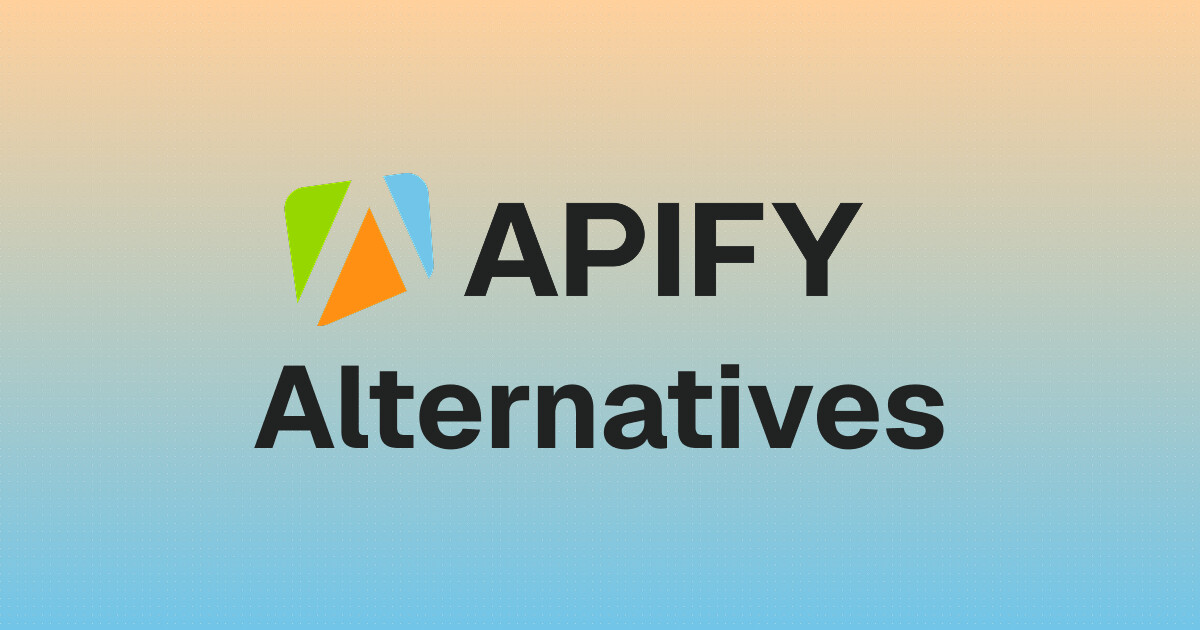14 best AI agent examples you have to check out in 2026
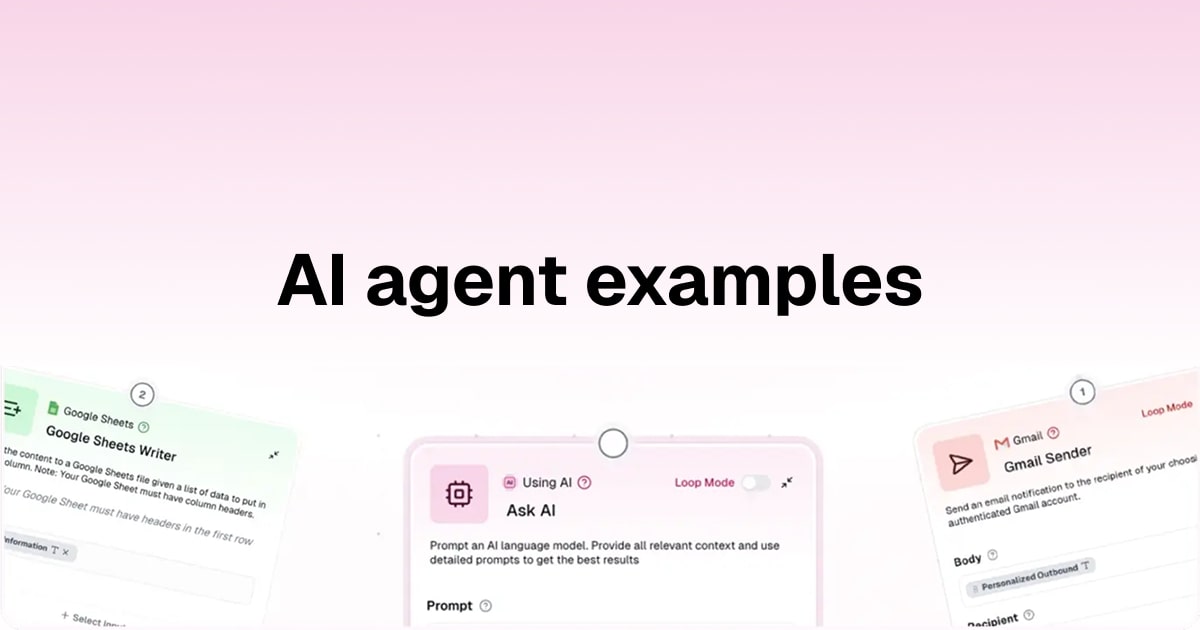
AI agents are all the craze right now. It feels like if you’re not kicking your feet up on your desk right now, while these agents do all of your work, you’re doing something wrong.
But it’s not really like that. Not at all, actually.
Most people, especially in tech, still don’t know what they can automate at work. And on top of that, they still don’t know how to create AI agents that can help you accomplish tasks autonomously.
Luckily for you, I’ve spent the better part of the last year going deep into AI. I’ve used agents to help me scale my own personal blog to over 200K readers per month, to help me scale my marketing agency, and to help cut costs to improve my profit margins.
And in this article, I’m going to show you some of those AI agents that have helped me do all of that. But, I’ll also show you tons of other examples some of the biggest companies like Webflow, Shopify, and Instacart are using internally.
At the end of the article, I’ll even show you how to uncover your own use cases for AI agents, and how to build them really fast.
But before we go into our AI agent examples, let’s go over how some companies are using them today.
What are people using AI agents for?
AI agents are being used by companies of all sizes, from small startups to enterprise businesses. Most of the use cases for AI agents run in departments like marketing, HR, customer support, sales, operations, and any sort of administrative tasks.
For example, Webflow uses AI agents to automate social media listening. They created an agent that gives them an automatic report on what people are saying about their brand on social media platforms and Reddit. This report can give you things like brand sentiment, so you can either intervene in the conversation or just get a better idea of how your brand is performing.
Another example is Instacart, where their sales team has created an automated high-value outreach agent. What they did was create an agent that takes data from Salesforce such as contracts, gross merchandise value, and purchase history and helps their sales team figure out who to reach out to for enterprise deals. This has led to doubling the number of new meetings booked without adding any more human headcount.
These examples are just the tip of the iceberg. For example, I have created my own agent that takes any piece of content that I write (like this blog post) and helps me proofread it, essentially eliminating the need to have a copy editor.
Long story short, there are a lot of ways to leverage AI agents.
What are the most used AI agents
Most artificial intelligence agents are simply machine learning workflows. The idea is that you create an automated workflow that essentially goes and does things on your behalf. But the way to make this work is that you first have to understand how to do something yourself. If you can't teach it to a coworker or somebody else, then you're going to have a hard time teaching an agent to do it as well.
But if you already have complex tasks that you do on a daily basis, and you deeply understand the workflows, then this is where you can become an AI-powered human.
According to our research, here are the departments using AI agents the most:
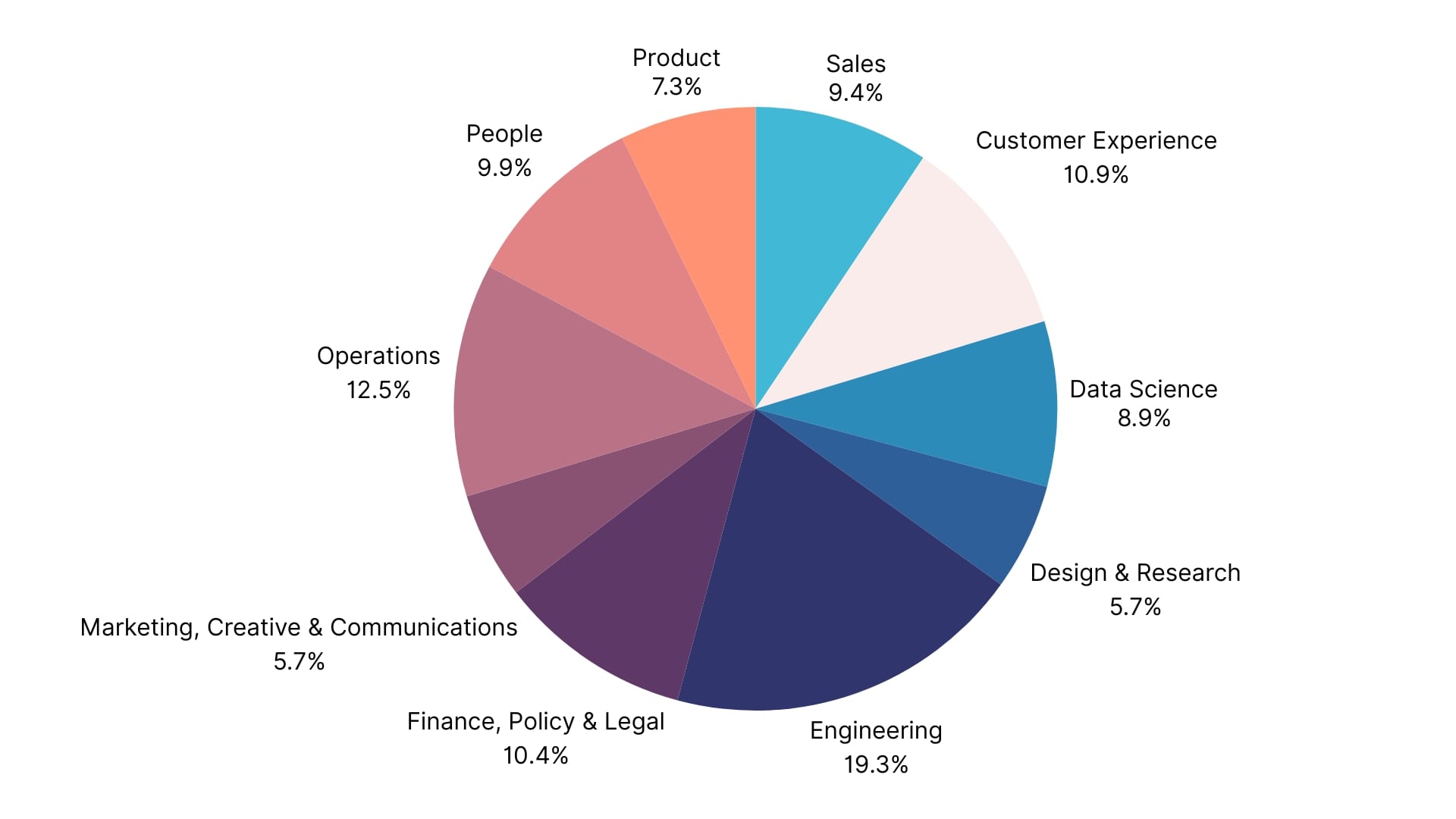
As you can see, engineering is the top use case and it makes sense. LLMs (large language models) are great at writing code and understanding algorithms using natural language processing.
But what follows that is operations. And this is where you get the most benefit from AI by creating utility-based agents. This is where tools like AI help you create automated workflows to complete tasks on your behalf.
And after that we have customer experience. These are AI tools in the customer service space that can help you handle support tickets through AI chatbots, help you create self-serve knowledge bases, and a ton more (I'll show you some examples in this category below).
And then we have some other use cases like sales, marketing, finance that can help with lead scoring, content creation, and financial analysis (I'll also show you some examples below).
The bottom line is there are a lot of different use cases, but as of today it looks like the top departments that get the most benefit from AI agents would be:
- Engineering
- Operations/HR
- Customer support
- Sales
- Marketing
- Finance
Okay, now let's get into some examples of AI agents that you can use today.
14 best AI agent examples tech companies are using in 2025
Here are some great AI agent examples:
- AI Slackbot agent
- Brand listening agent
- Social media sentiment agent
- SEO analyzer agent
- Reddit researcher agent
- Newsletter creator agent
- YouTube to SEO blog agent
- Scrape and categorize leads agent
- Personalized outreach agent
- Inbox summarizer agent
- Invoice processing agent
- Inventory alert agent
- Email triage agent
- Crypto coin researcher agent
Let’s go over each one.
1. AI Slackbot agent

- Category: Operations
If you work at a company that uses Slack and has internal documents, knowledge bases, and FAQs scattered across different platforms, then creating an AI Slackbot is one of the coolest use cases for an AI agent.
There are a handful of different things you can use this chatbot for like:
- Policy Q&A: Instead of teammates going through Google Docs for vacation policies or sales guidelines, they can just ask the bot directly in Slack
- Document search: Connect it to your knowledge base so people can get instant answers instead of filing support tickets
- Sales support: Have it pull Salesforce data and cross-reference with your sales policies to give specific recommendations on discounts and terms
- Onboarding help: New hires can ask questions about company processes without bothering their manager
The beauty of this agent is that it can starts simple and gets more sophisticated as you build it out. You can start with a basic setup that reads Slack messages and responds with AI. Then you can add context by connecting it to your company documents. The bot pulls information from internal docs and gives accurate, contextual answers instead of generic responses.
The cool thing is you can also add routing logic so the bot only responds to relevant questions. If someone asks about sales policy, it answers. If they're just chatting about lunch plans, it stays quiet. You can even build it to handle complex scenarios like pulling client details from Salesforce when someone includes an opportunity ID.
If you want to lean how to build this agent, you can check out a live stream we did on it here.
You can also check out the full template for this AI Slackbot here.
2. Brand listening agent

- Category: Marketing
First on our list is a brand listening agent. This is great for social media marketing teams who have a tough time figuring out what people are saying about their brand on different social media platforms.
For example, you can create a brand listening agent that goes out and scrapes comments on platforms like TikTok, Facebook, or Instagram and can help you judge whether or not you need to intervene and reply.
This is an agent that Webflow used to achieve a 100% response rate to important comments. This agent also helped them create daily social media reports that could be emailed directly to team members, giving them a high-level overview of the state of social for their brand.
If you want to learn how to build this agent for yourself, you can check out our live stream on this:
3. Social media sentiment agent
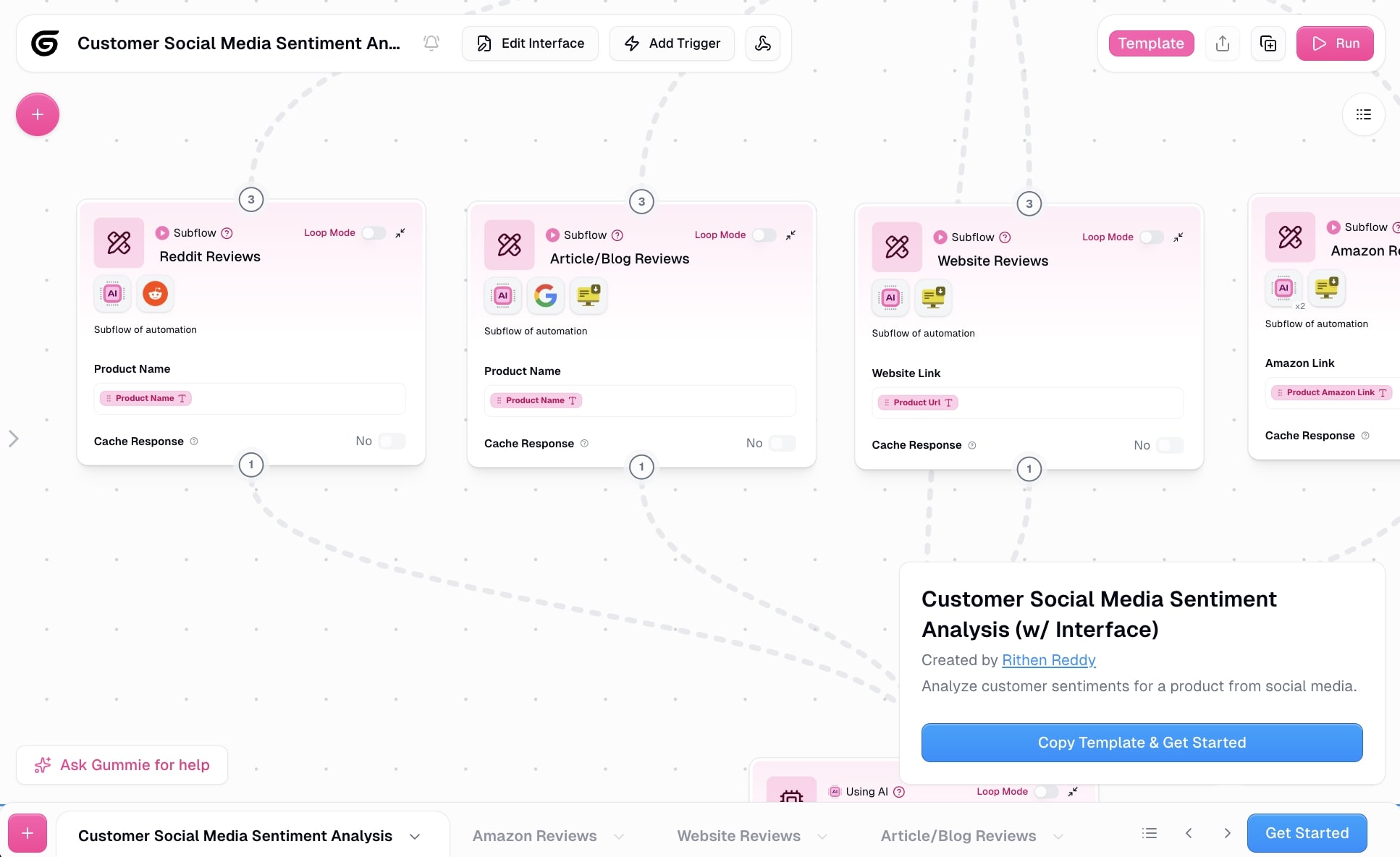
- Category: Marketing
Similar to the first agent example, the next one is a social media sentiment agent. This is where you create an AI agent that can browse through different social media platforms and discover what people are saying about either your own brand or your competitors' brands.
This can help you gauge sentiment on your products or services and discussions happening everywhere from Reddit to different news outlets and blog posts to reviews on websites and even Amazon reviews.
From there, the agent takes all the data from all those platforms and AI agents work to feed all this data into any LLM AI model of your choice to do a sentiment analysis. From there, you can have the agent send you real-time reports to your email, Slack, or really anywhere that you want.
You can actually build this agent with Gumloop, and here's the exact template that you can check out and build this agent for free.
4. SEO analyzer agent
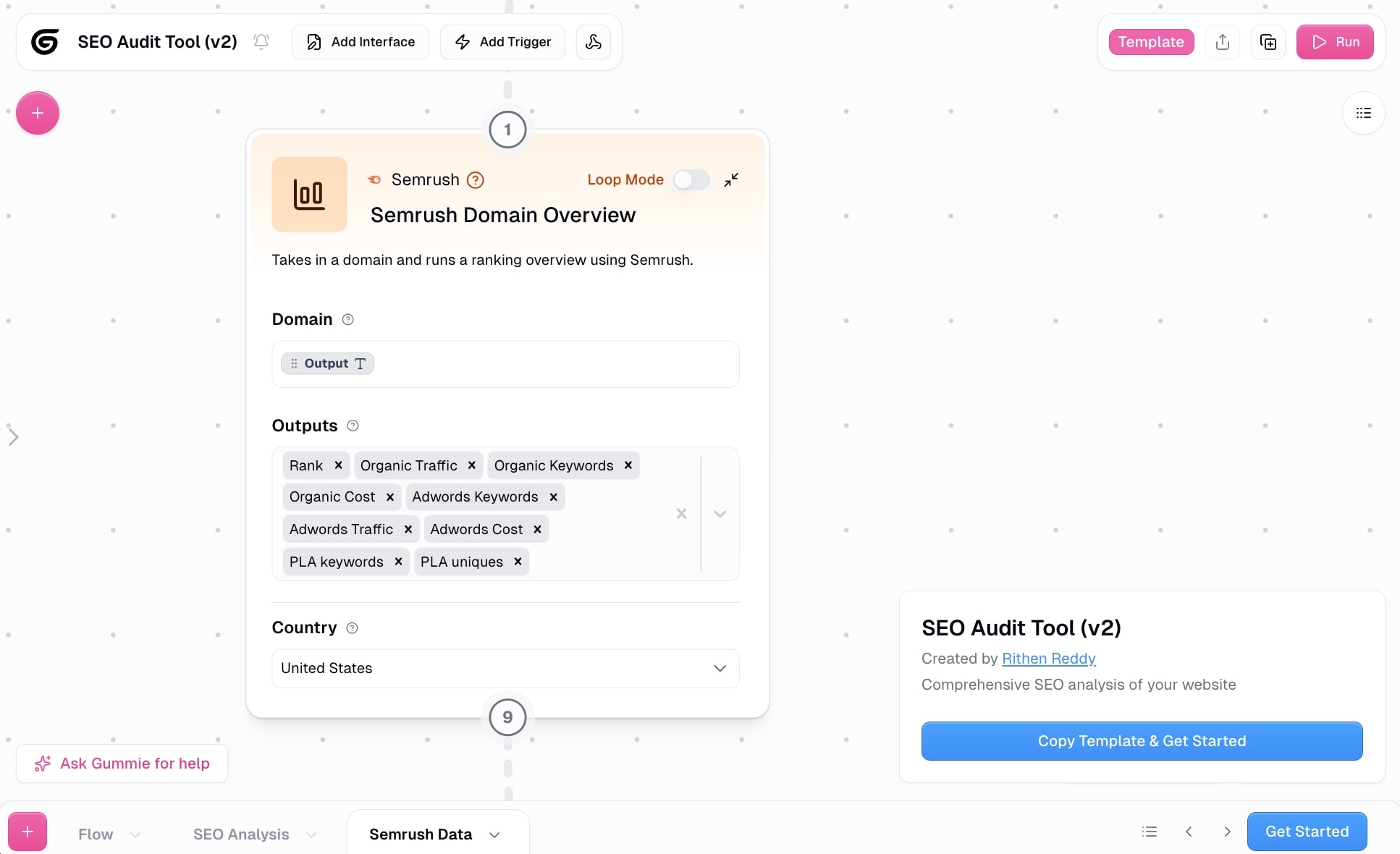
- Category: Marketing
One popular use case for creating generic AI bots is in the SEO space. However, there are a lot of people doing this wrong.
AI is not great at creating strategies on its own. But what it is good at is taking data and manipulating it in a way for humans to create strategies on. For example, when it comes to SEO, you can build things like:
- Keyword research agent: This can scrape Google search results for a given keyword and analyze all the results while also feeding that information into an SEO platform like Semrush to give you a full report on the keyword.
- SEO audit agent: Scrape your website, input it into Semrush, take all that data and feed it into ChatGPT or Claude, and generate a comprehensive SEO audit report.
- Blog keyword optimizer: This can take any existing blog posts on your site and give you optimization recommendations on what keywords you should be including in your content to help it show up for more search queries.
For all these agents, I put links to templates above. You can also check out more SEO AI agent examples by clicking here.
5. Reddit researcher agent
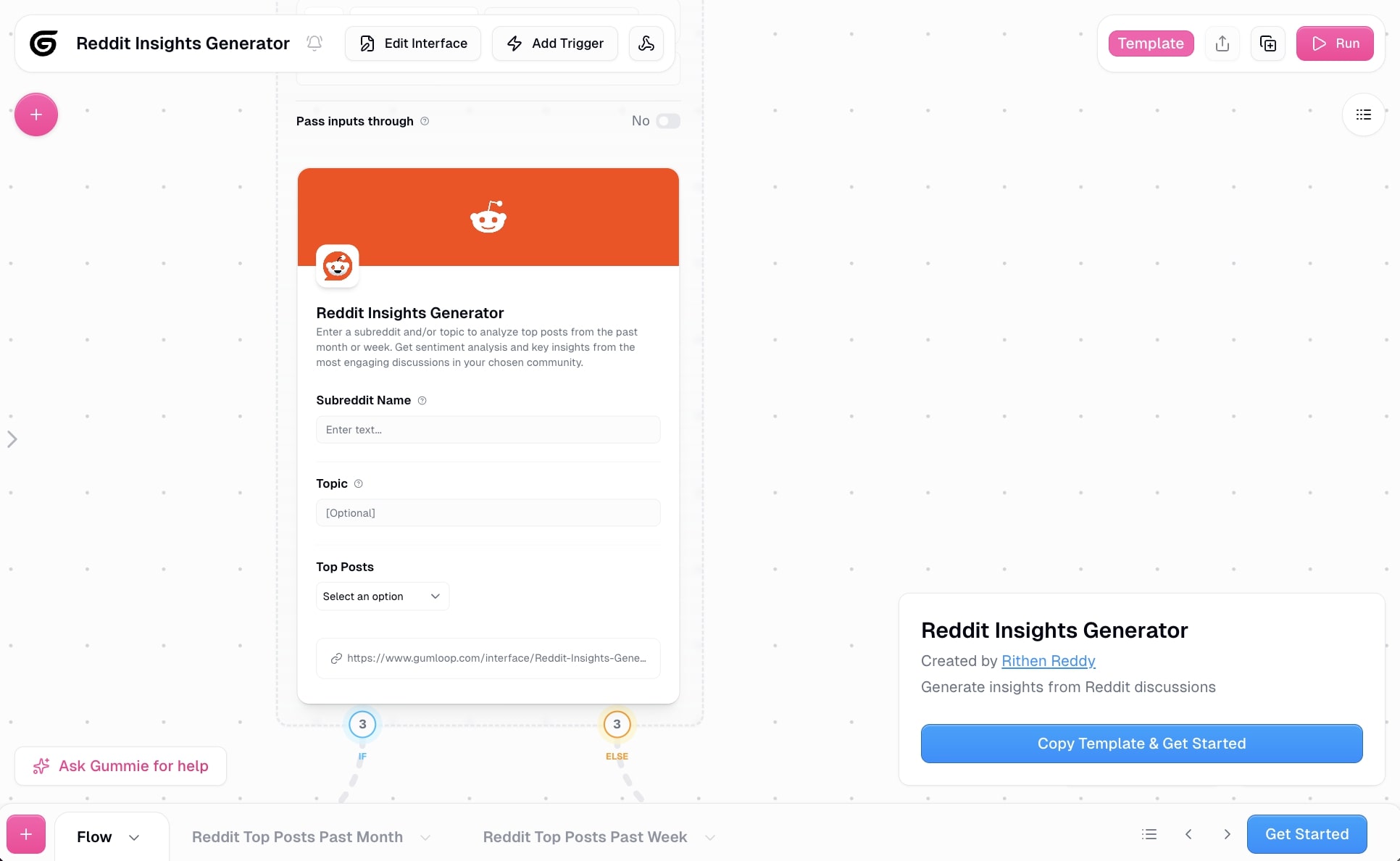
- Category: Media/news
Reddit is a massive platform that people use in their decision-making process. Whether it's to find a product recommendation or just get advice on things that people would be too embarrassed to ask their friends in real life, it has become a melting pot for user-generated content.
Because of this, it's become favorable for artificial intelligence models to train off of. There are tons of insights that you can find through Reddit. Because of this, creating a Reddit researcher agent is a no-brainer for anyone trying to pull information from the platform.
For example, you can have an agent that takes discussions from any subreddit of your choice, feeds all those discussions into AI based off of whatever prompt you want, and can then send you a report back in the form of a Google Doc, email, or really whatever.
For example, let's say you have a blog for first-time home buyers. There's a subreddit for this with over 700,000 people in it. You can have your AI agent browse through this specific subreddit to help you uncover common questions that people have. And from there, you can create blog posts based off of those questions.
You can even get creative with it and stack on another AI agent that then takes that information and starts to create a blog article outline. But I'm not going to get too far ahead of myself, and I'm going to save this topic for the last section of this blog post.
6. Newsletter creator agent
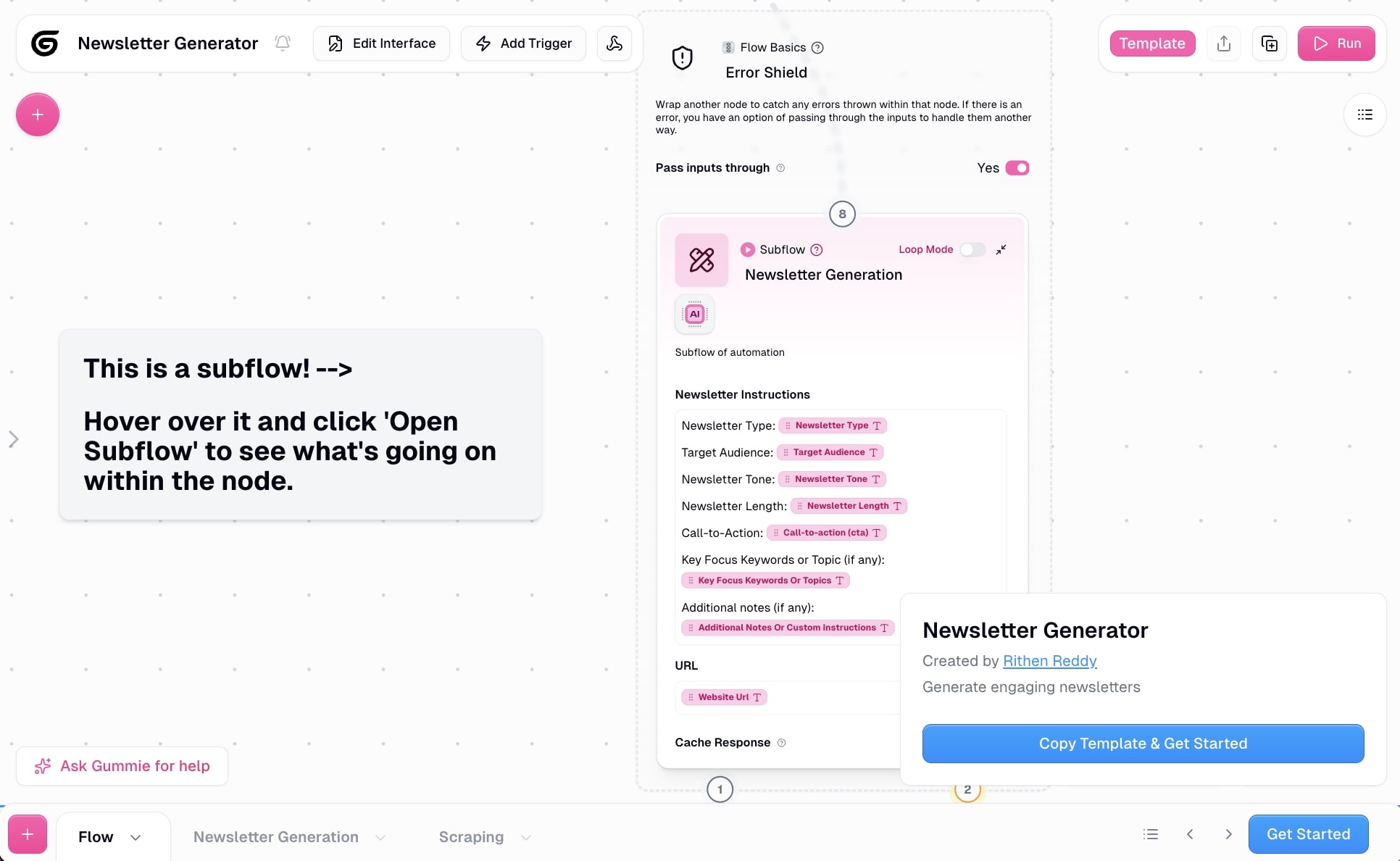
- Category: Media/news
Staying on the topic of media and content creation, the next example is a newsletter creator agent. This is where you create an agent that can scrape information from anywhere on the web, including information from Reddit (like in the previous example), and then the agent goes out and writes a draft for a newsletter.
This is great if you have an industry newsletter that curates the best tips and top trending topics in your niche. Because AI agents are great at scouting the web for data and information, this can help you easily curate information and help you save hours of manual work.
From there, the agent can take all that curated content and feed it into an LLM that you've prompted based on how you want your newsletter formatted to be, and then it can rewrite the full draft for you to review before you publish it to your subscribers.
This strategy is especially great if you're creating local newsletters where you can curate fun events in your community or things that your neighbors would be interested in.
7. YouTube to SEO blog agent
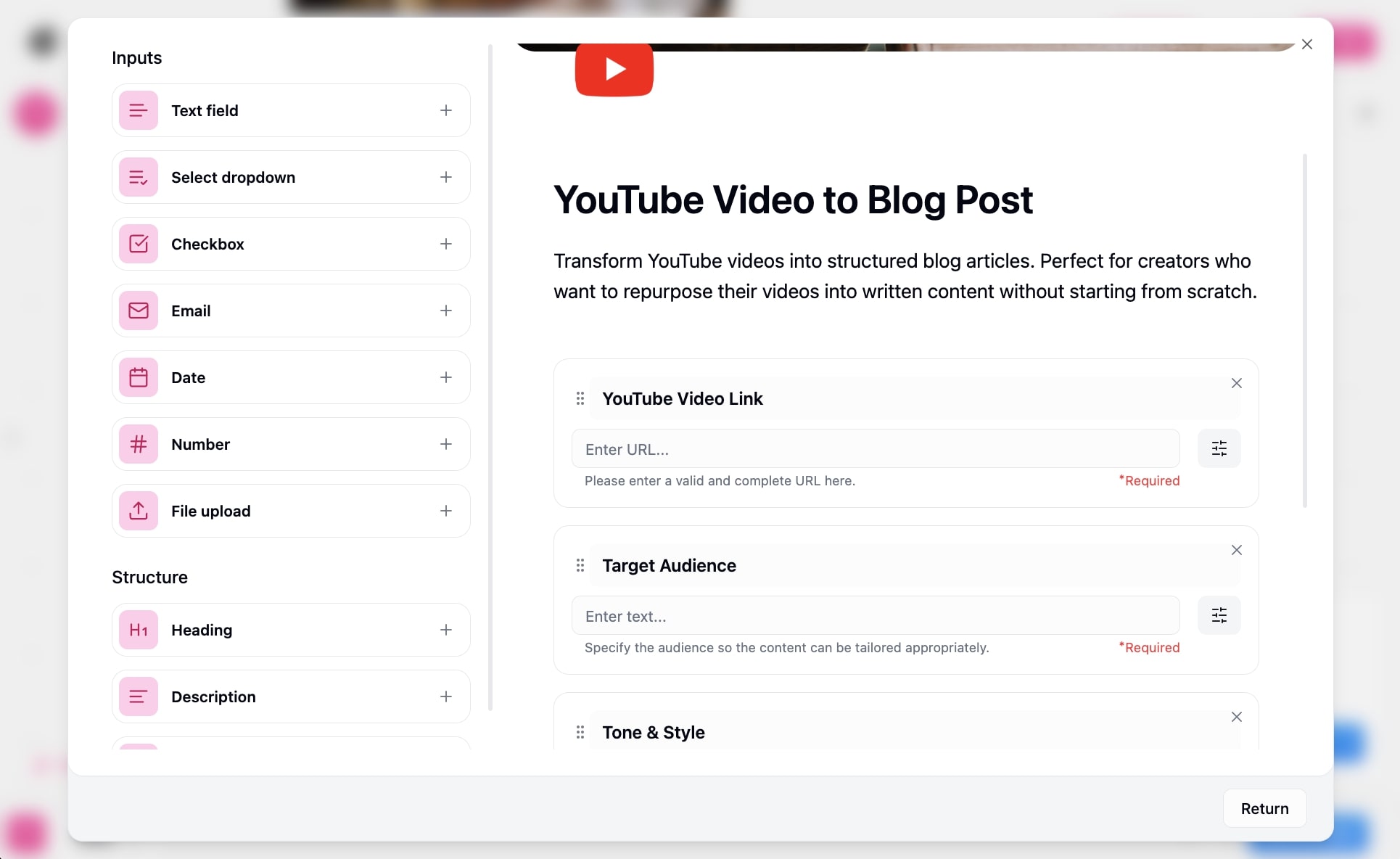
- Category: Media/news
If you're already creating content on YouTube, then it's most likely to your benefit to turn those YouTube videos into blog posts to help you rank for more search queries on your website. Embedding YouTube videos into blog posts also helps with SEO rankings, so you might as well recreate your keyword-focused YouTube videos into blog posts.
And what better way to do this than have an AI agent take your YouTube script and content and convert that into a blog post with your own original insights. This is way better than having AI just write content from the beginning for you (something I never recommend you do), because it's taking information from a video that you have created yourself (assuming the script you're reading in the video isn't just some AI slop).
This AI agent is so underrated because it's completely streamlined the video-to-text of your content creation process. It's one of those real-world examples that's great for media brands and any company that is trying to grow through organic content.
You can check out this agent, and use it yourself, by clicking here.
8. Scrape and categorize leads agent

- Category: Sales
As mentioned earlier, agentic AI is great at scraping the web. If you work in sales, then creating a scrape and categorizing leads agents can help you quickly find prospects to reach out to.
This agent can go and scrape websites or LinkedIn and it can find certain criteria for who to actually make note of during the scraping process. It can then input those notable contacts into a Google Sheet, and also categorize them based off of certain criteria that you set.
This can help you eliminate hours of manual scraping on LinkedIn, and can help you build an outreach list really fast. Which will nicely bring us into our next example...
9. Personalized outreach agent
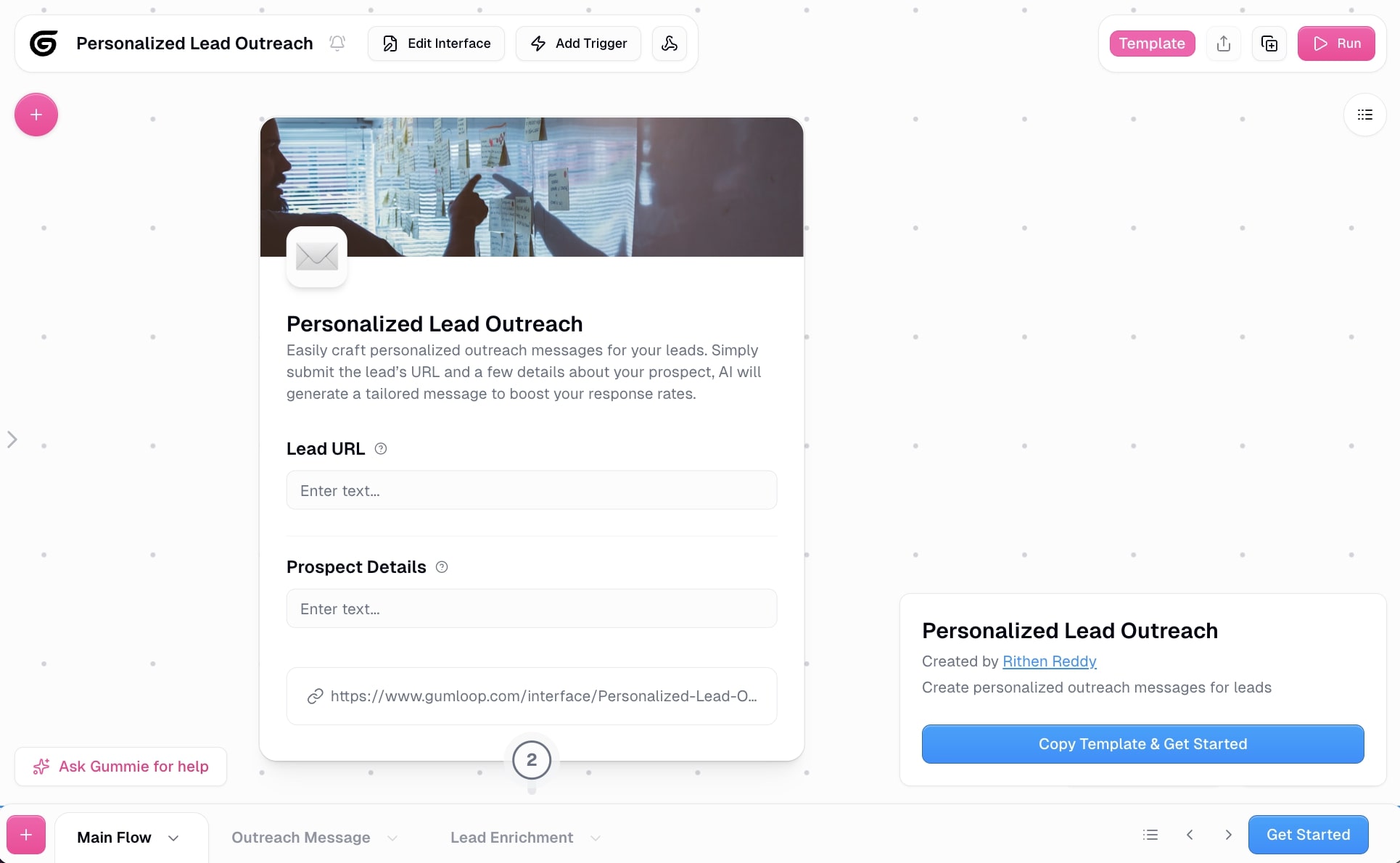
- Category: Sales
If you already have a list of leads that you want to go after, you can create a personalized outreach agent that can draft personalized emails on your behalf.
You can also create a personalized outreach agent to scrape the internet for prospects, input those prospects into AI to categorize them, and then write up a draft email. So you don't even have to have a list of prospects first to use this agent — you can just stack on the example from before into this one and create a broader sales agent.
Here's a template for this agent that you can literally use today.
But this also isn't just limited to email. For example, you can have an agent go into LinkedIn and send messages straight through LinkedIn DMs. This can be a more personalized approach as a lot of people browse around LinkedIn (especially when they're procrastinating) and there's something about getting a notification that is more exciting than seeing another email pop up in a chaotic inbox.
You can check out the template for this agent here.
However, I do want to preface by saying that you should not be spamming people if you do decide to use this agent. This is one of those types of AI agents that can be controversial, so use with caution.
10. Inbox summarizer agent
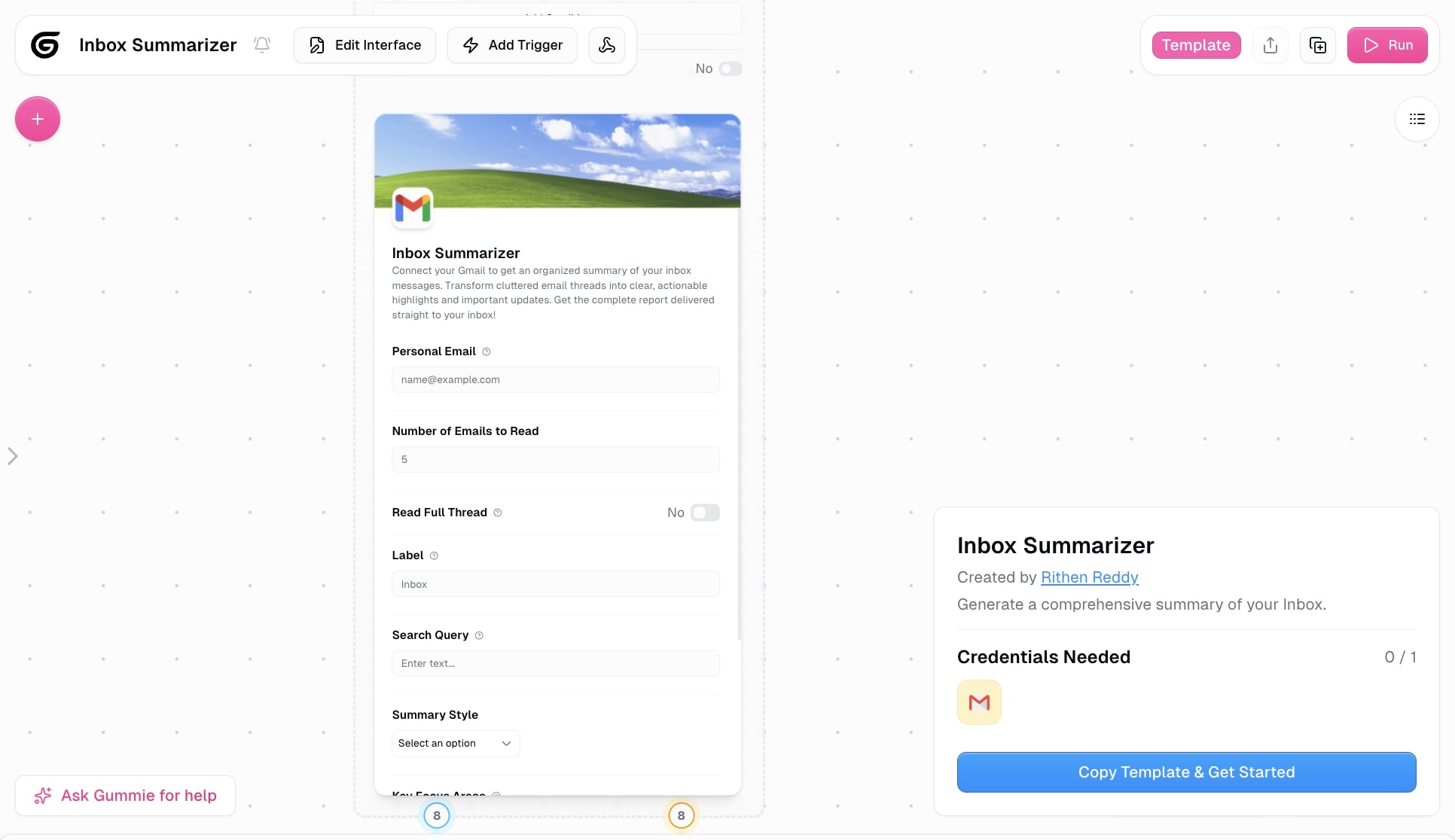
- Category: Admin
If you're like me and you can never reach inbox zero, creating an inbox summarizer agent is the way to go. This AI agent can help you generate a comprehensive summary of all the emails you get in your inbox.
For example, you can integrate it with your Gmail and it can go through and figure out what each email is saying and if it's actually worth your time paying attention to. You can use AI to set rules on which emails to ignore (like if someone's trying to pitch you something) and which emails to pay attention to (like invoices or potential partnerships).
You can build this AI agent for yourself by using this template here.
11. Invoice processing agent

- Category: Admin
If you're handling invoices manually, you're probably wasting way too much time on data entry and chasing down approvals. An invoice processing agent can completely automate this workflow and save your accounting team hours every week.
This agent can extract all the important data from your invoices like invoice numbers, dates, amounts, vendor details, and line items. It doesn't matter if you're dealing with standard PDFs or scanned documents, the agent can handle both.
You can set up the agent to automatically categorize invoices by department, flag any that need manual review, and even route them to the right people for approval. For example, invoices under $500 might get auto-approved, while anything above that gets sent to your finance manager through Slack or email.
The agent can also sync everything to your accounting system, update your Google Sheets or Airtable databases, and even catch duplicate invoices before they become a problem. This means your AP team can focus on the important stuff instead of mindlessly entering data all day.
You can build this agent using Gumloop's invoice processing template, which handles everything from data extraction to approval workflows. It's one of those agents that pays for itself pretty quickly just by eliminating manual work.
12. Inventory alert agent
- Category: Operations
If you're running an ecommerce business, you know how painful it is to run out of popular items or have too much cash tied up in slow-moving inventory. An inventory alert agent can monitor your stock levels and automatically alert you when it's time to reorder, helping you avoid stockouts without overstocking.
This is actually something that can work with Shopify (one of Gumloop's customers) websites to keep track of inventory across multiple channels. The agent can pull data from your inventory systems, whether that's Google Sheets, Airtable, or your ecommerce platform, and set different alert thresholds for different product categories. For example, your best-selling items might trigger a reorder alert (without human intervention) when you hit 50 units, while seasonal products might only need alerts at 10 units.
What makes this really powerful is that you can use MCP (Model Context Protocol) to connect with any inventory system and set up smart alerts that actually understand your business. The agent can send notifications through Slack for your team, email vendors directly to start the reorder process, and even generate purchase orders automatically. It can also escalate alerts based on how long items have been low stock or adjust thresholds seasonally.
If you want to build this agent, you can use the Gummie chatbot within Gumloop to help set up this workflow based on your own specific needs and ecommerce apps you may already be using..
13. Email triage agent
- Category: Customer support
If your customer support inbox is constantly overflowing, an email triage agent can automatically sort and route emails so your team doesn't waste time figuring out what needs attention first. This agent reads incoming emails, categorizes them by priority and department, and routes them to the right people automatically.
For example, it can flag VIP customer emails as high priority, send billing questions straight to your finance team, and route technical support requests to your product team. The agent can even create support tickets in your CRM, send automated acknowledgment emails to customers, and alert your team through Slack when something urgent comes in.
This is especially useful for growing companies that are drowning in customer emails but don't want to hire a full-time person just to sort through their inbox. The agent handles the boring stuff so your team can focus on actually helping customers instead of playing email detective.
This is another custom advanced AI agent that can be built with Gumloop. Just ask Gummie how you can set this up based on whatever email tool you may already be using for your customer support, and it will guide you through the entire building process.
14. Crypto coin researcher agent
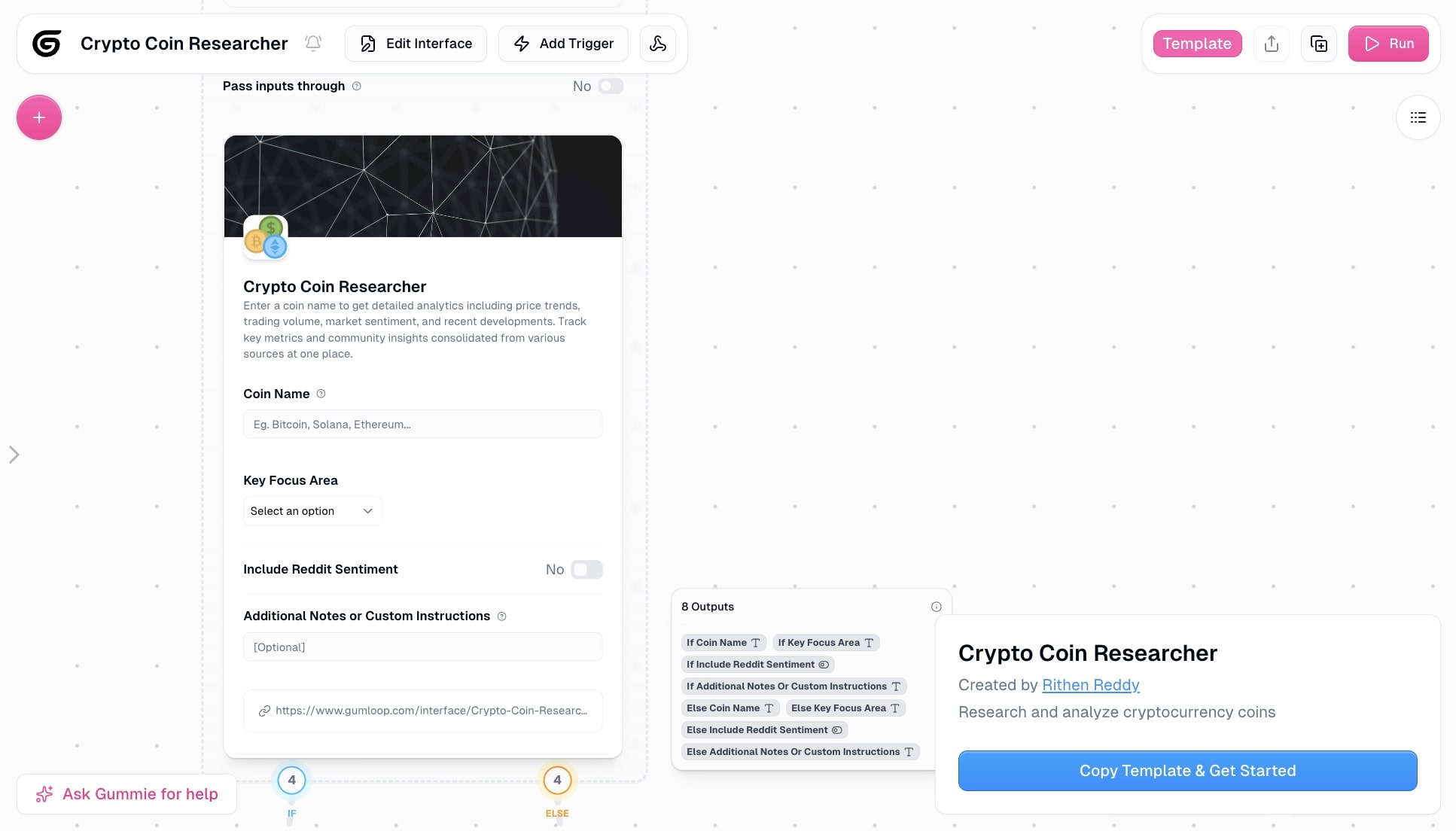
- Category: Financial analysis
If you're into crypto trading or just trying to keep up with the latest coins, a crypto coin researcher agent can automatically gather data and analysis on different cryptocurrencies so you don't have to spend hours scrolling through Twitter and Reddit for alpha.
This agent can scrape data from crypto websites, social media platforms, and news sources to pull together comprehensive reports on specific coins. It can analyze things like market sentiment, recent news, technical indicators, and community discussion to give you a complete picture before you make any investment decisions.
The agent can also monitor multiple coins at once and send you alerts when there's significant news or price movements. Instead of constantly checking CoinGecko and crypto Twitter, you can just get a daily digest of everything important happening in your portfolio or watchlist.
You can build this agent using our crypto coin researcher template here.
Create your own AI agents
Building AI agents is here to stay. If you're somebody who is great at what you do and already has nailed down complex workflows, then now is your time to shine by using an AI agent builder to create your own army of little automated robots.
As you can see, there are tons of different examples above that can help you streamline existing workflows. But again, you need to already have a workflow that you do manually to get the most benefit from AI systems.
However, if you still aren't sure what you can build, you can use Gumloop's AI assistant, Gummie, to help you get ideas of the types of agents that you can create. You can leverage anything from generative AI to creating goal-based agents to integrating with APIs from other tools that you're already using and create multi-agent systems that can do multiple tasks at once.
With large enterprise companies starting to leverage these agents, it’s apparent that these tools are essential for anyone who wants to stay competitive. Whether you're a solo entrepreneur trying to scale without hiring, or part of a larger team looking to eliminate repetitive tasks, there's probably an agent that can help you work smarter instead of harder. And I hope the examples above sparked some ideas for you!
Start small with one of the examples above, see how much time it saves you, and then expand from there. Before you know it, you'll have your own automated workforce helping you cut your 8 hour days into 4 hour days.
Read related articles
Check out more articles on the Gumloop blog.
Create automations
you're proud of
Start automating for free in 30 seconds — then scale your
superhuman capabilities without limits.


















